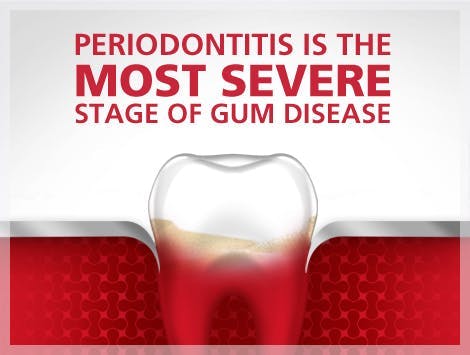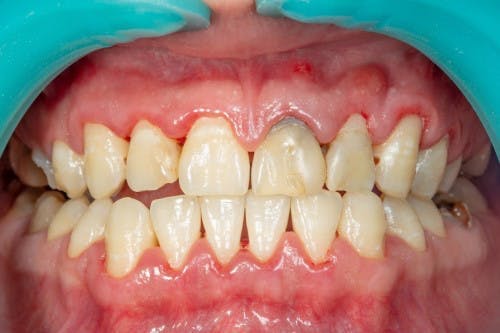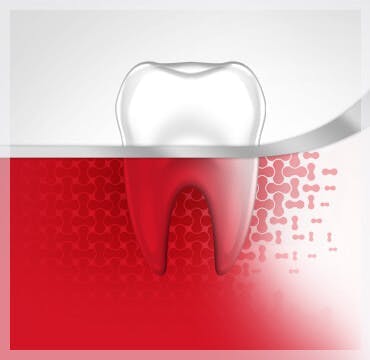Periodontitis is the most severe form of gum disease (or periodontal disease), and the leading cause of tooth loss in adults.
A recent report by the Centers for Disease Control and Prevention (CDC) estimates that 47.2 per cent of American adults are affected by periodontitis – that's 64.7 million people aged 30 and over across the United States.i
According to the American Academy of Periodontology's periodontitis definition, it is a chronic inflammatory disease that affects the gum tissue and bone supporting the teeth.i If left untreated, it can ultimately cause the bone to erode.
Unlike the earlier stages of gum disease, periodontitis is not reversible. It's important to act early to prevent it from developing.
Symptoms of Periodontitis
The symptoms of periodontitis can include:ii
Gums that bleed easily, particularly when you brush or floss your teeth
Loose teeth or changes to the position of your teeth
Pain when chewing
Tooth loss
What to Look Out for
Warning signs of periodontitis include any changes to the teeth and gums. Healthy gums feel firm and are pale pink in color. Any changes to this could be a sign of gum disease.
Look out for darker pink, red or purple gums; gums that feel swollen, puffy or tender to the touch; and gums that bleed easily such as when you brush or floss your teeth.
You might also notice that your teeth look longer than normal – this is a sign of receding gums. Teeth may also feel looser, or fit together differently when you bite. In some cases, you may notice pus or new gaps developing between your teeth.
Persistent bad breath, a foul taste in your mouth, and any kind of pain when you chew or brush could also be indications of periodontitis.
Any of these warning signs should be checked out as soon as possible by your dentist or hygienist.
Causes of Periodontitis
Gum disease is a progressive condition, so periodontitis can develop if the milder form of gum disease – gingivitis – is left untreated.
Gum disease is commonly caused by ineffective oral hygiene. Regular brushing and flossing removes plaque from the teeth, while ineffective oral hygiene allows it to build up on the teeth and harden into tartar around and below the gum line.
Bacteria in the plaque and tartar irritates the gums, leading to inflammation. When your gums become inflamed, they can pull away from your teeth – forming spaces called ‘pockets’. If left untreated, plaque can get trapped in these pockets, causing a bacterial infection that mayworsen over time and can destroy the tissue and bone (periodontium) that support the teeth. As the bone around the teeth erodes, this can cause teeth to loosen, so they may fall out or need to be removed by a dentist.ii
Besides poor oral hygiene, other factors that can cause or contribute to your risk of periodontitis include diabetes, HIV/AIDS, cancer and genetics. Smoking also makes you more susceptible to gum infections.ii
Stages and Types of Gum Disease
Periodontitis is the final, irreversible stage of gum disease. It is preceded by gingivitis, which is milder and reversible.ii It's important to know about the different stages of gum disease.
Symptoms of gingivitis are less severe. They include red, swelling and bleeding gums, and can usually be identified by warning signs such as spitting blood when you brush your teeth.
There are also different types of periodontitis. The most common is chronic periodontitis, characterized by the progressive deterioration described above.ii
Less commonly, a small number of people are affected by aggressive periodontitis, which typically has a genetic cause and results in more rapid progression of bone and tooth loss.
Finally, people affected by malnutrition or a suppressed immune system – such as those with HIV/AIDS, or those undergoing cancer treatment – may develop necrotizing periodontal disease, where a lack of blood supply (necrosis) results in a severe infection.
How to Prevent Periodontitis
Prevention is the best treatment when it comes to gum disease. The sooner you can act against gingivitis or early periodontitis, the better the outcome is likely to be.
Maintain good oral hygiene by brushing your teeth and flossing or using interdental brushes twice a day to remove plaque, and visiting your dentist every six months.
See your dentist or hygienist straight away if you notice any of the warning signs of gum disease, so they can investigate the problem and act early to prevent the infection worsening.
Treatment Options
While periodontitis is irreversible, getting treatment for periodontitis can stop it progressing any further and reduce the risk of tooth loss. Scaling and root planning are cleaning procedures carried out by a dental professional to remove plaque and tartar, and medicated mouthwashes and antibiotics may also be recommended to treat the infection.iii In more advanced cases, your dental professional may recommend surgical treatment.iv
Complications of Periodontitis
Besides tooth loss, there is some evidence that gum disease could also cause heart disease, stroke and respiratory problems as a result of bacteria entering the bloodstream through your gums.
What Is Periodontitis – Next Steps
Periodontitis is a severe, irreversible form of gum disease, caused by the build up of bacteria both above and below the gum line. Although periodontitis is irreversible, it can still be treated to help control the disease from progressing.
While there is no cure for periodontitis (including using Parodontax), you can maintain good oral hygiene by using specialist Parodontax toothpaste such as Parodontax Complete Protection and Parodontax Clean Mint twice daily and visiting your dentist regularly.
Read more frequently asked questions about gum health, gum disease and treatment.
SOURCES
By clicking any of the links below you will be taken to an external website that is independently operated and not managed by GSK. GSK assumes no responsibility for the content on the website. If you do not wish to leave this website, do not click on the links below.
- CDC: Half Of American Adults Have Periodontal Disease. American Academy of Periodontology. https://www.perio.org/consumer/cdc-study.htm. Accessed 06/25/19.
- Periodontitis. Mayo Clinic. https://www.mayoclinic.org/diseases-conditions/periodontitis/symptoms-causes/syc-20354473. Accessed 18/12/19.
- Scaling and Root Planing. Mouth Healthy. https://www.mouthhealthy.org/en/az-topics/s/scaling-and-root-planing. Accessed 18/12/19.
- Regenerative Procedures. American Academy of Periodontology. https://www.perio.org/consumer/gum-disease-regenerative-procedure. Accessed 20/01/20.







